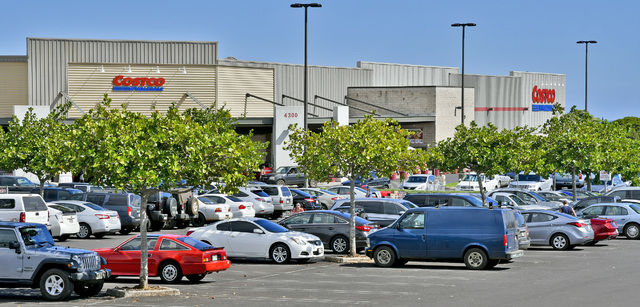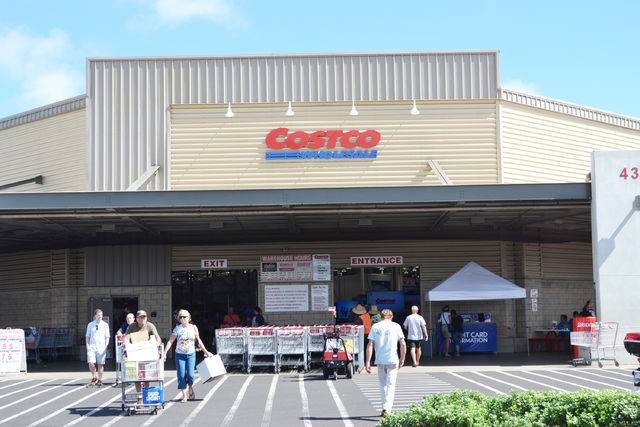Business owners, residents reflect on Costco’s impact on the Garden Isle
Like many Kauai residents, Jeff Elkins shops at Costco. The Kapaa business owner also competes with the membership- only warehouse club.
“The computer shop industry has had a tough road since before Costco ever came along,” said Elkins, owner of The Computer Hospital. “We sell repairs. Also, I try to compete with them in the sales market. It makes us small guys work a little harder. It does absolutely that, but I don’t believe that’s a negative. I have been fairly successful competing in the arena with them.”
In mid-October, Costco celebrated its 10-year anniversary on the Garden Isle. Since its opening, the warehouse store has been very popular among residents and visitors.
Business owners from all parts of Kauai agree that the second-largest retailer in the world has impacted Kauai in terms of cost of living, culture, economy and competition.
For Terry Kuribayashi, owner of Kukuiula Market in Poipu, Costco has had a negative impact on the community.
“For us, being a ma-and-pa store, Costco has crucially hurt a lot of the local businesses,” she said. “Of course I understand the families that have to go and shop there because it’s a lot cheaper to shop there. But it has changed the whole culture of the island.”
Kuribayashi did admit that she shops at Costco for produce to use in the market’s Anake’s Juice Bar. But the dependency on retailers like Costco has caused a cultural shift, especially with the younger generations, she said.
“I feel like the money doesn’t stay on the island because it goes out,” she said. “Everybody is becoming more like the Mainland in a sense. I feel like everybody has forgotten about the local culture and everybody is worried more about pricing instead of trying to support the local businesses that was the culture of it all.”
But some businesses are saving money with the help of Costco.
Bryan Gerald, co-owner of the Kalapaki Beach Hut, a popular breakfast and lunch joint that’s been in business for almost 30 years, said he and his family shop at Costco every day for supplies. They buy non-perishables, canned goods, coffee and some produce.
“It’s vital at this point, just to keep all the essentials on the shelf,” he said. “They’re just a step away, just two miles up the road from us. It’s very convenient.”
Before Costco, Gerald said they purchased produce from local growers.
“Prices at Costco don’t fluctuate as much as the local purveyors,” he said. “You can expect, for the most part, that prices will remain stable.”
Another plus is being able to get a visual of the items he’s buying at the Lihue retailer.
“On the local front, you’re depending on the purveyor itself to organize (goods),” he said. “When you’re navigating through Costco, you’re able to have that hands-on face value for what you’re getting. It’s like the market experience. You see it and test it for yourself and able to evaluate.”
Costco declined to comment for this story.
The Seattle-based retailer employs about 143,000 full- and part-time employees and about 214,000 nationwide. It offers competitive benefits packages to all its employees, including health and dental care, and long-term care insurance to employees with 10 or more years of service.
As of this month, Costco has 721 warehouses in operation worldwide (with 504 locations in the U.S. and Puerto Rico) and generated $118.7 billion at the end of fiscal year 2016.
As of May 2016, Costco listed 86.7 million cardholders on its membership list.
Chris Holmes, owner of Kauai Bound, a snorkel and golf club rental business in Lihue, said rental companies suffered when Costco initially opened its doors.
“When I was working for other snorkeling companies, that was one of the main issues we had from them,” he said. “People would go over there and buy their gear and use it for the week and bring it back.”
But Holmes said that issue is in the past.
For his business’ and family’s needs, Holmes has nothing but praise for the retailer.
“I’m able to get a lot of the things for my shop where I don’t have to pay the shipping to get them out here,” he said. “Things like my beach chairs, umbrellas, because I can’t find them anywhere else. They do help and I know I use them constantly.”
Holmes, who moved from Kansas City with his wife 10 years ago, said having Costco during their transition to the island helped with the cost of living.
“That was big for us. I know just for our groceries and gas, I like having them here,” he said. “I do wish they had a little bit more produce and things like that. It’s hard to find good, local produce in Lihue. We always have to go down to Koloa or Kapaa to find it — other than farmers market day.”
Mason Koetje of Kekaha, a Kauai resident for over 30 years, mainly buys non-perishable items from Costco.
“We’ve been able to get items in bulk and feed a small army,” he said. “It’s lowered the overall food costs per family dramatically. If they went belly-up and they left, everybody would be hurting. Every family, I think, leans so heavily on Costco.”
Laura Cristobal Andersland, owner of Salty Wahine in Hanapepe, admits that Costco makes living on Kauai more affordable, especially for larger families.
“We buy meat there. We still love our Makaweli beef and we still love our Kauai Shrimp,” Andersland said. “We still shop at the farmers markets, but there’s certain things you still gotta get at Costco. They don’t have artichokes at the farmers market, so we get it at Costco. They make it affordable, which is nice. I think it’s had a great impact.”
Like many others, Andersland purchases supplies from Costco for her business.
“For us, I think it helped us actually. … We can buy these nice, big, monster quart bags and office supplies at a pretty good price and our packing tape, computer paper, scissors,” she said. “We do get a few things as far as spices like lemon pepper. Nobody here makes it, so I have to get it from there.”
The alternative, Andersland said, would be shipping supplies from the Mainland.
“Whenever we need something and we can’t get it here, I will ask Costco if there’s somewhere they can bring it in,” she said. “Sometimes it’s yes. Sometimes it’s no. They’re very helpful.”
Another benefit of shopping at Costco — especially for visitors — is the regularity of pricing nationwide, Andersland said.
“We travel a lot and we travel to Costco wherever we go to. The price in the Mainland Costco is the same price as the Costco here,” she said. “The shipping doesn’t seem to be a factor with that particular store chain, whereas for all the others — us included — shipping impacts our bottom line costs.”
Steven Higgs of Port Angeles, Washington, was shopping with his family at the Lihue Costco Friday.
Shopping for his party of 11 at Costco only made sense, he said.
“Imagine going to your local market, especially to a place that still caters to tourists, I still end up paying twice as much for feeding 11 people,” Higgs said. “It’s tough to feed a party of 11 people on a budget at a local market no matter what part of the country you live in.”
When Costco first opened, Eric Nordmeier, director of Kauai WorkWise, thought the retailer would have a negative impact on smaller businesses. But the reality was contrary to his assumptions, he said.
“(Businesses here have) revised their strategies, tailored their products to what is available,” he said. “They may have experienced a dip in sales, but customer service, availability of resources — people will go towards that. No matter how much it costs — there’s limits to that — they’ll turn around. We’re creatures of habit. Whoever accommodates our needs, it’s easier for us to do that.”
Circling back to ma-and-pa shops, the small guy with the personal service will hopefully always have a place in this market, Elkins said.
“I don’t really think that Costco can replace the ma-and-pa stores,” he said. “They make us work harder. I’ve never been afraid of hard work myself. They do make us focus our efforts. They remind me on a daily basis what my business is, which is service and repairs. It makes us all step up our game a little bit. I don’t think Costco’s presence in the market is a negative. It’s just another option, really. We need options here.”
But Kuribayashi said once ma-and-pa stores disappear, “Kauai will end up being a whole corporate world and the whole island will change its history and its culture.”
People on Kauai “need to know and appreciate where they come from, where they started from,” Kuribayashi said. “This is who we are. That’s why the local businesses are so important to shop and support them, to keep bigger corporations away. Because the island’s so small, there’s not enough people, so the pie’s just keep getting smaller and smaller to the point the local businesses cannot survive anymore.”
But many, including Holmes, still shop local, despite Costco’s presence.
“I’m always supporting small, local businesses. We always hit Sueoka’s market,” he said. “Because it’s such a small island, you know people who work there or you’re related to them. Just by supporting the local businesses, you’re keeping the local economy going and you’re getting a lot better quality stuff. Support what’s here.”
And in terms of supporting local business, Andersland said Costco is a good neighbor.
“I see a lot of Kauai Made products in the store, very prominently placed. When you pretty much walk in … you see Kauai Kookie, Kauai Coffee,” she said. “The items are even in front of their own Kirkland brand, which is nice. I don’t know if that’s a movement of theirs throughout the country, but here it’s good form.”



